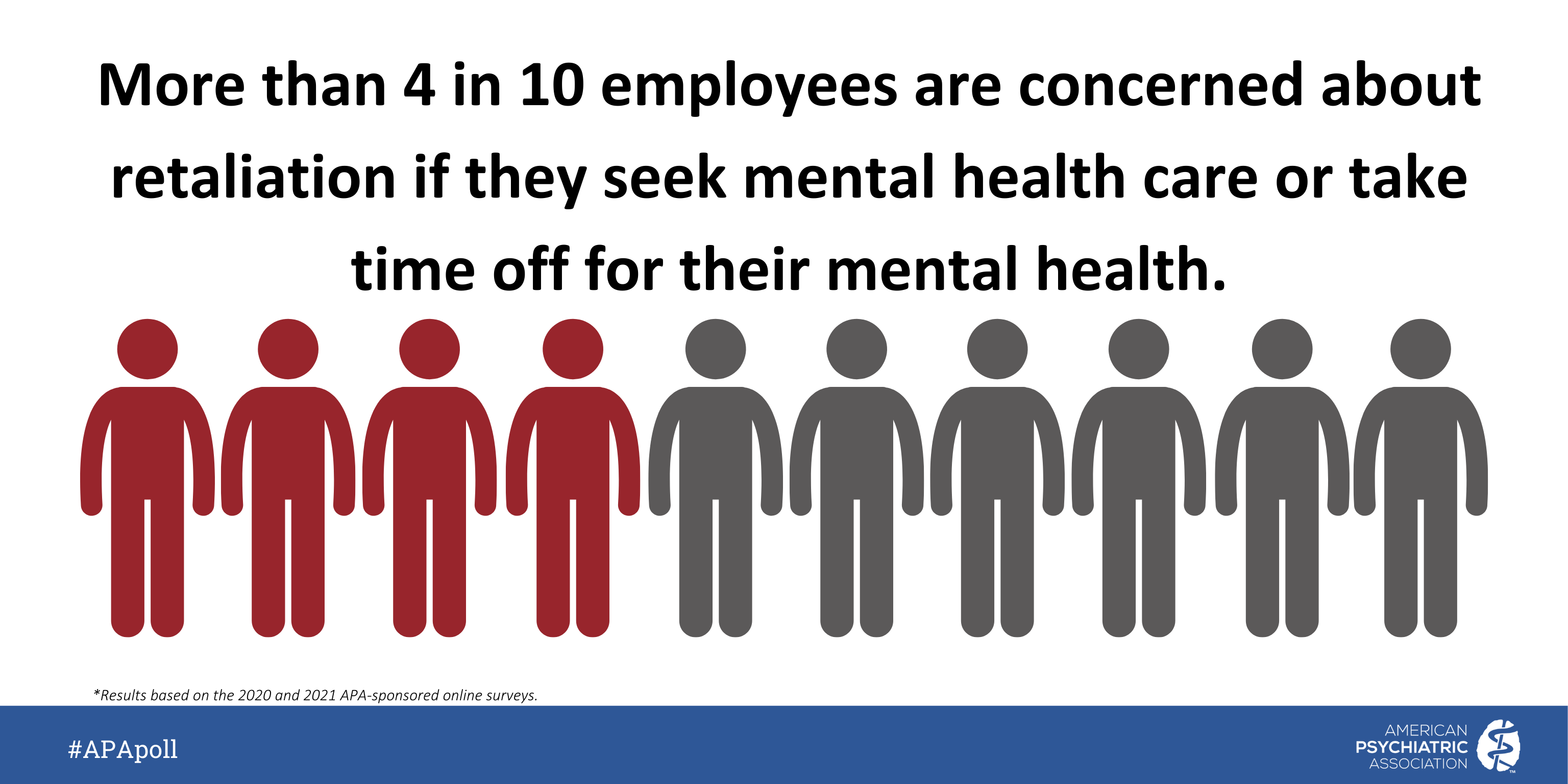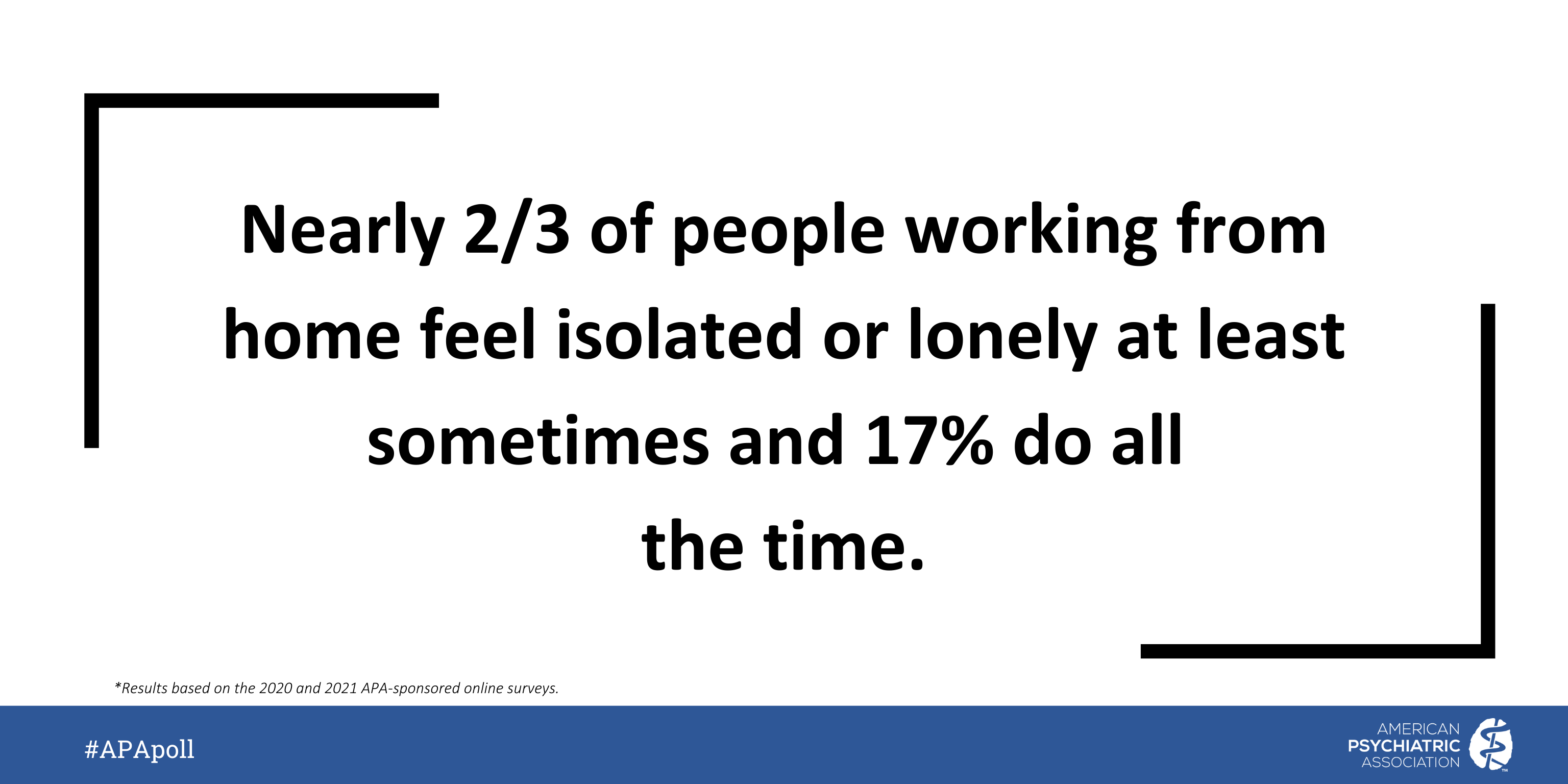As Americans Begin to Return to the Office, Views on Workplace Mental Health Are Mixed
Washington, D.C. – A recent national public opinion poll of U.S. adults by the American Psychiatric Association (APA), finds that over half of employees say their employers have become more accommodating to their mental health needs during the pandemic. However, slightly fewer employees than last year say they can talk openly about mental health at work.
The majority of employees working from home say they experienced negative mental health impacts, including isolation, loneliness and difficulty getting away from work at the end of the day.
- Fifty-four percent of employees report their employer has become more accommodating to their mental health needs since the start of the pandemic while 15% said less and 31% didn’t know. However, only one in five said their employer has offered additional mental health services, down from 35% last year. Just over half of employees say they can talk openly about mental health with coworkers (56%) and supervisors (56%), down slightly from last year (65% and 62% respectively).
- When looking at how employers treat employees who may have mental health issues, 28% said their employer had become more supportive over the course of the pandemic; 33% said the same as before; and only 9% said less supportive (31% didn’t know). Hispanic (38%) and Black (36%) employees were more likely than white employees (23%) to say their employer had become more supportive during the pandemic. Younger workers (42% of 18 – 29-year-olds) were more likely than older workers (23% of 45-64 year-olds) to say their employer had become more supportive.
“It’s not surprising that in light of the pandemic that mental health is on peoples’ and employers’ minds,” said APA President Vivian Pender, M.D. “What’s worrisome is that given this discussion, many people, particularly younger people, are still worried about retaliation if they take time off for mental health. This is stigma in action, and it has to stop.”
“The poll shows us that working from home, while it kept us safe from COVID-19 and brought some benefits, also meant many Americans felt lonely and isolated,” said APA CEO and Medical Director Saul Levin, M.D., M.P.A. “As we shift back into our offices, or whatever alternatives are made available, I encourage business and organizational leaders to visit the APA Foundation’s Center for Workplace Mental Health, which has resources on ensuring employees’ mental well-being through COVID and beyond.”
Almost two-thirds of employees feel their employer offers sufficient mental health care resources and benefits (65%) and feel comfortable utilizing mental health services with their employer (64%). The responses were similar across age groups and among Hispanics, African Americans and whites.

- Worryingly, more than four in 10 employees are concerned about retaliation if they seek mental health care or take time off for their mental health. Younger workers are most concerned. Nearly six in 10 (59%) of employees 18 to 29 years old and 54% of employees 30 to 44 years old are somewhat or very concerned about retaliation or being fired if they take time off for mental health needs, compared to 39% of 45 to 64-year-olds. Black and Hispanic employees are somewhat more concerned about retaliation than are whites.
- Compared to last year, slightly fewer employees report their employer offers mental health benefits, including primary care with sufficient mental health coverage (28%, down from 34%), mental health days (14%, down from 18%) and on-site mental health care (12%, down from 16%). About one in seven employees reports their employer offers mental health apps, such as Calm or Headspace, or mental health training for supervisors and managers.
Working from Home

- Sixty percent of employees reported working at home at least a few days a month and nearly a third (32%) worked at home all the time (19% a few days a week; 9% a few days a month). While working from home has advantages and benefits, it also comes with drawbacks, including isolation and loneliness and difficulty getting away from work for personal time.
- Nearly two-thirds of people working from home feel isolated or lonely at least sometimes and 17% do all the time. More than two-thirds of employees who work from home at least part of the time report they have trouble getting away from work at the end of the day always (22%) or sometimes (45%). Younger adults (73% of 18 to 29-year-olds and 73% of 30 to 44-year-olds) were more likely to report feeling isolated or lonely working at home compared to older adults (48% of 45 to 64-year-olds).
More on the poll and workplace mental health
The full results of the poll are available here. The new findings come from an APA-sponsored online survey conducted March 26 - April 5, 2021, among a representative sample of 1,000 adults 18 years of age and older. The equivalent margin of error is +/-3.1 percentage points. Additional polling information from the 2021 poll is available here and information from polls in October 2020 and prior years are available here.
For organizations and businesses seeking help on supporting the mental health of their workforce, APA Foundation’s Center for Workplace Mental Health provides tools, resources and information, and has recently issued toolkits and webinars on COVID-19, remote work, and more. The Center recently released NOTICE. TALK. ACT.® at Work, an e-learning training for managers on supporting employees’ mental health needs.
American Psychiatric Association
The American Psychiatric Association, founded in 1844, is the oldest medical association in the country. The APA is also the largest psychiatric association in the world with more than 37,400 physician members specializing in the diagnosis, treatment, prevention and research of mental illnesses. APA’s vision is to ensure access to quality psychiatric diagnosis and treatment. For more information please visit www.psychiatry.org.
